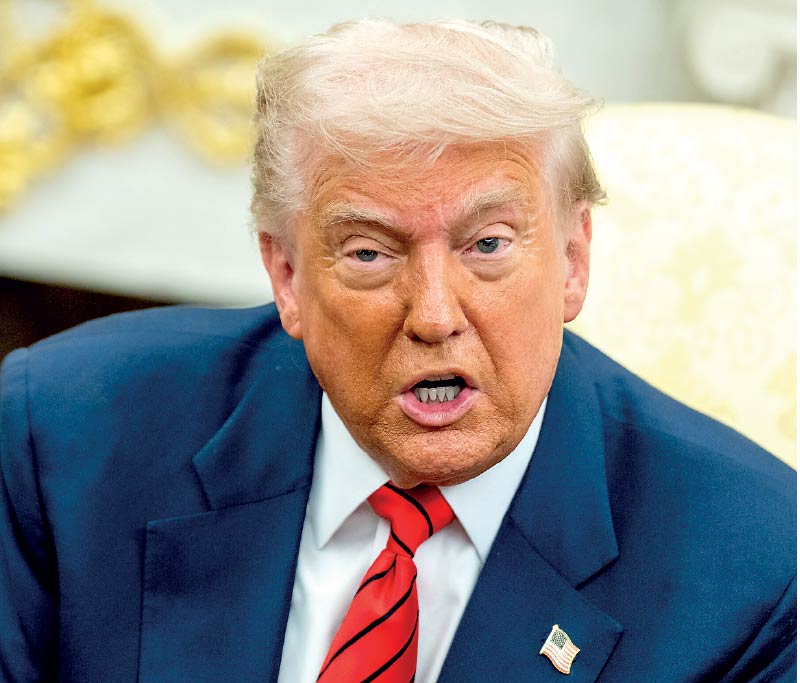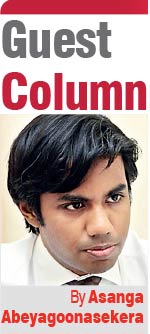Wednesday Feb 18, 2026
Wednesday Feb 18, 2026
Thursday, 6 November 2025 03:38 - - {{hitsCtrl.values.hits}}

Trump’s courage lies not in perfection, but in refusal—to look away, to soften what must be said, to call evil by another name
 From the jungles of Shan State to the streets of Bogotá, the same architecture persists—drug lords, arms smugglers, human traffickers, and cyber syndicates, all protected by regimes that trade sovereignty for survival. To confront them is not merely to enforce law; it is to resist the decay of civilisation itself
From the jungles of Shan State to the streets of Bogotá, the same architecture persists—drug lords, arms smugglers, human traffickers, and cyber syndicates, all protected by regimes that trade sovereignty for survival. To confront them is not merely to enforce law; it is to resist the decay of civilisation itself
 There is a silence that follows tragedy—a phone call in the night, a trembling voice, a parent who will never be whole again. A needle, a pill, a decision made in darkness. In that moment, the world seems unbearably indifferent. Yet indifference is never neutral—it is the shadow in which evil thrives.
There is a silence that follows tragedy—a phone call in the night, a trembling voice, a parent who will never be whole again. A needle, a pill, a decision made in darkness. In that moment, the world seems unbearably indifferent. Yet indifference is never neutral—it is the shadow in which evil thrives.
Trump’s war against the unseen empires of crime begins from that silence. He does not fight abstractions; he strikes at the machinery that devours human lives. Beneath the fragile order of nations lies a darker economy—one that trades not only in drugs and weapons but in despair.
I have spent years among those who study this hidden order—at the Economic Crime Symposium at Cambridge University—where minds from Interpol, law enforcement, and academia gather to trace the anatomy of global corruption. For 42 years, this symposium has built a vast body of knowledge, layer upon layer, each generation adding its colour to the same unfinished canvas. Those before me witnessed what I now confront in altered form; those who follow will craft better defences against it. Its founder, Professor Barry Rider, foresaw the many shades through which economic crime would evolve—how it would infiltrate nations, institutions, and lives. And through these decades, one truth has become inescapable: economic crime and geopolitics are not separate realms but two faces of a single system. Rogue regimes stretch their reach across borders, funding corruption, capturing elites, and manufacturing chaos as strategy.
Compass for a disoriented world
In Washington, at the height of this disorder, the Economic Crime and Geopolitics Index (ECGI) was born—a compass for a disoriented world. Since then, nations such as the Philippines, Thailand, Sri Lanka, and Myanmar have begun to look within. In Manila, $ 20 billion has vanished into ghost projects. In Myanmar, digital scam centres and in Thailand, the Chinese gambling networks and spread like a second state, undermining the first.
It is within this same underworld that America’s own tragedy takes root. More than 80,000 Americans died from drug overdoses last year—sons and daughters whose futures dissolved in a chemical haze. Trump calls this not a crime, but a war. And in war, he believes, clarity must replace hesitation. Seven boats were struck off Venezuela’s coast. Thirty-two traffickers perished. Their deaths will not bring back the dead, but their survival would have killed thousands more.
At the United Nations, Trump spoke without ornament: “To every terrorist thug smuggling poisonous drugs into the United States, be warned—we will blow you out of existence.” It was not cruelty, but an assertion of moral gravity—a declaration that the state must defend the living from the merchants of death.
In Sri Lanka, I met the deputy minister of public security Sunil Watagala —a man waging his own battle against the networks that rot the foundations of the State. President Anura Kumara Disanayake has declared his war on crime with an old truth reborn: “This country cannot have two States. There can only be one—the legitimate State built by the democratic power of the people. The black State must be dismantled.”
Criminal networks have infiltrated politics
His warning is stark. Criminal networks have infiltrated politics, hiding behind local councils and parliamentary campaigns. Seventy-three T-56 rifles from a military camp have been traced to these groups. The ECGI now places Sri Lanka at a risk level of 74.2—a grave position among South Asian nations, surpassed by only a few in vulnerability to economic crime. If this trend endures, the island’s stability may not. Yet, in the President’s defiance, one hears the faint pulse of recovery—a nation trying to reclaim its spine.
In 2012, I was invited to witness the Mexican campaign launched by President Felipe Calderón. I recall how he spoke with quiet conviction about the darkness entrenched in his own society. It was his final year in office, and his war on cartels had revealed how deeply organised crime could infiltrate the core of a nation.
Years later in Sri Lanka, after the Easter Sunday bombing, a former president—still grappling with the tragedy—asked me, while I was at defence research, “Is there a connection between my anti-drug operation and the bombing?” I did not believe there was any. Yet the question itself revealed a deeper truth: when criminal networks operate with vast resources and impunity, even leaders can feel the state slipping beyond their control.
These networks often wield budgets greater than the poorer states they undermine, spreading influence through politics, business, and blood. The faces change, but the struggle remains the same: a state at war with its reflection. Sri Lanka’s challenge today echoes that enduring lesson.
Far across the ocean, the Caribbean hums with movement. Ten thousand American troops have been redeployed; eight warships and a submarine circle near Puerto Rico. To some, this is provocation. To history, it may be preparation. Venezuela’s hybrid regime—a nexus of cartels, corruption, and foreign patrons—is being challenged where it breathes.
Where profit and power merge into one
Trump’s campaign is not military alone; it is existential. It rejects the quiet surrender to forces that deform democracy from within. Economic crime, he insists, is the skeleton key to tyranny. Dictatorships—whether in Caracas, Beijing, or Pyongyang—feed on these invisible transactions, where profit and power merge into one.
From the jungles of Shan State to the streets of Bogotá, the same architecture persists—drug lords, arms smugglers, human traffickers, and cyber syndicates, all protected by regimes that trade sovereignty for survival. To confront them is not merely to enforce law; it is to resist the decay of civilisation itself.
Trump now turns to Asia. In Malaysia, at the ASEAN Summit, Foreign Minister Mohamad Hasan spoke of regional efforts to confront transnational crime and strengthen extradition treaties. It is an acknowledgment that corruption has become a global language—and that nations must answer it in chorus.
Trump’s courage lies not in perfection, but in refusal—to look away, to soften what must be said, to call evil by another name. Bureaucrats will argue. Criminals will not. They understand only fear, and Trump, unrefined but unflinching, speaks that dialect.
Every missile fired at sea carries a cost. Leadership is often a form of solitude—a burden carried without applause. Yet the measure of courage is not in popularity but in the willingness to confront the abyss and not retreat.
When a cartel falls, when a shipment is seized, we see only numbers. But behind each act lies something quieter—a father’s vow that no other child will be lost to the same silence. In that sense, every strike is not vengeance but remembrance.
To lead in an age of shadows is to act without certainty, to strike not for glory but for the unseen redemption of others. History will debate his methods; time will remember his intent. For those who have buried their children, Trump’s war against the architects of addiction may be the first gesture of justice in a long time.
(The writer is the Executive Director of the South Asia Foresight Network under the Millennium Project in Washington, DC.)